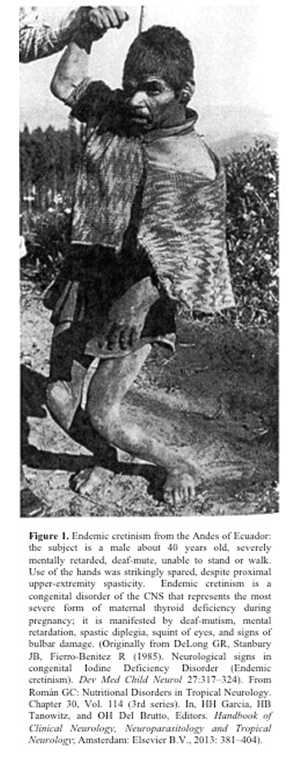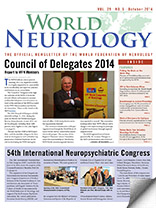The Importance of Measuring Thyroid Function in the Expectant Mother
By Gustavo C. Román, M.D.
 Encouraging news for the prevention of autism emerged from the results of a research study conducted by an international collaborative team conformed by Prof. Gustavo C. Román, MD, from the Methodist Neurological Institute (Houston, Texas) and researchers from the Generation R Study at Erasmus University Medical Centre in Rotterdam, The Netherlands, including Akhgar Ghassabian, MD, PhD; Jacoba J. Bongers-Schokking, MD, PhD; Vincent W.V. Jaddoe, MD, PhD; Albert Hofman, MD, PhD; Yolanda B. de Rijke, PhD; Frank C. Verhulst, MD, PhD; and Henning Tiemeier, MD, PhD. The results point to the deficiency of maternal thyroid function during the first trimester of pregnancy as a significant factor in the causation of autism in the child. Pregnant women with deficient thyroid hormone are nearly four times likelier to produce autistic children than women with normal thyroid function. The study was published in the prestigious journal Annals of Neurology1.
Encouraging news for the prevention of autism emerged from the results of a research study conducted by an international collaborative team conformed by Prof. Gustavo C. Román, MD, from the Methodist Neurological Institute (Houston, Texas) and researchers from the Generation R Study at Erasmus University Medical Centre in Rotterdam, The Netherlands, including Akhgar Ghassabian, MD, PhD; Jacoba J. Bongers-Schokking, MD, PhD; Vincent W.V. Jaddoe, MD, PhD; Albert Hofman, MD, PhD; Yolanda B. de Rijke, PhD; Frank C. Verhulst, MD, PhD; and Henning Tiemeier, MD, PhD. The results point to the deficiency of maternal thyroid function during the first trimester of pregnancy as a significant factor in the causation of autism in the child. Pregnant women with deficient thyroid hormone are nearly four times likelier to produce autistic children than women with normal thyroid function. The study was published in the prestigious journal Annals of Neurology1.
The research was conducted in a cohort of more than 4,000 Dutch mothers and their children, and it supports the view that autism can be caused by lack of maternal thyroid hormones T4, also called thyroxine, and T3, which is crucial to the migration of fetal brain cells during embryo development, early in pregnancy. The most common cause of thyroid hormone deficiency is a lack of dietary iodine, given that T4 contains four atoms of iodine. There are also environmental contaminants and dietary factors that affect thyroid function2.
According to Prof. Román, the hypothesis linking thyroid and autism originated from his early experiences as a neurologist in the Andes of South America where the deficiency of iodine in table salt results in high prevalence of goiter and congenital problems in children including high rates of deafness, borderline mental retardation and, in the most severe cases, endemic cretinism. (See Figure 1.) Román recently described this topic in detail3.
Iodine deficiency remains common throughout the world; including industrialized countries where it was believed to be eradicated by the use of iodinated salt. This could explain the upward trend in the incidence of autism observed in these countries. Another factor is the lack of determination of T4, T3 and urinary iodine levels in expectant mothers early in pregnancy, and the use of prenatal vitamin supplements lacking the extra supplementary iodine needed during pregnancy and lactation.
The complex gene network regulated by thyroid hormone during brain development is being deciphered with the use of experimental animal models4 and should provide a better understanding of the complex problem of autism spectrum disorders.
References
1. Román GC, Ghassabian A, Bongers-Shokking JJ, et al. Association of gestational maternal hypothyroxinemia and increased autism risk. Ann Neurol 2013; 74: 733–742. doi: 10.1002/ana.23976 (E-pub 2013 Aug 13). Chang K, Shin JI. (Letter to the Editor) Association of gestational maternal hypothyroxinemia and increased autism risk: The role of Brain-Derived Neurotrophic Factor. Ann Neurol 2014;75:971–972. doi: 10.1002/ana.24143 Román GC, Ghassabian A, Bongers-Shokking JJ, et al. (Reply) Ann Neurol 2014;75:971-972. doi: 10.1002/ana.24141
2. Román GC. Autism: transient in utero hypothyroxinemia related to maternal flavonoid ingestion during pregnancy and to other environmental antithyroid agents. J Neurol Sci 2007; 262: 15–26
3. Román GC. Nutritional Disorders in Tropical Neurology. Chapter 30, Vol. 114 (3rd series), Handbook of Clinical Neurology, Neuroparasitology and Tropical Neurology. Edited by HH Garcàa, HB Tanowitz, and OH Del Brutto. Elsevier BV: Amsterdam, 2013: 381-404
4. Berbel P, Navarro D, Román GC: An evo-devo approach to thyroid hormones in cerebral and cerebellar cortical development: Etiological implications for autism. Frontiers in Endocrinology 2014, ISSN: 1664-2392
